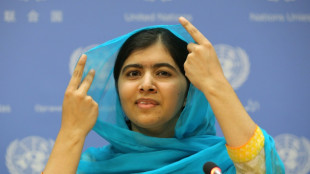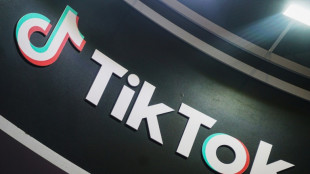
-
 Five things to know about New Glenn, Blue Origin's new rocket
Five things to know about New Glenn, Blue Origin's new rocket
-
Blue Origin set for first launch of giant New Glenn rocket

-
 Dutch police detain hundreds at climate protest
Dutch police detain hundreds at climate protest
-
Germany battles to secure stricken 'Russian shadow fleet' oil tanker

-
 Malala Yousafzai 'overwhelmed and happy' to be back in Pakistan
Malala Yousafzai 'overwhelmed and happy' to be back in Pakistan
-
'Education apartheid': schooling in crisis in Pakistan

-
 Smart glasses enter new era with sleeker designs, lower prices
Smart glasses enter new era with sleeker designs, lower prices
-
Supreme Court looks poised to uphold TikTok ban

-
 2024 hottest recorded year, crossed global warming limit
2024 hottest recorded year, crossed global warming limit
-
Germany reports foot-and-mouth disease in water buffalo

-
 US hikes reward for Maduro arrest after 'illegitimate' swearing-in
US hikes reward for Maduro arrest after 'illegitimate' swearing-in
-
Robots set to move beyond factory as AI advances

-
 Pro-Russian disinformation makes its Bluesky debut
Pro-Russian disinformation makes its Bluesky debut
-
UK gas reserves 'concerningly low', warns biggest supplier

-
 2024 warmest year on record for mainland US: agency
2024 warmest year on record for mainland US: agency
-
Meta policy reversal puts question mark on future of fact-checking

-
 Meta policy reversal puts question mark on furure of fact-checking
Meta policy reversal puts question mark on furure of fact-checking
-
Strong US jobs report sends stocks sliding, dollar rising

-
 US hiring beats expectations in December to cap solid year
US hiring beats expectations in December to cap solid year
-
UK gas reserves 'concerningly low': Biggest supplier

-
 Global stocks mostly fall before US jobs data
Global stocks mostly fall before US jobs data
-
Ubisoft: the 'Assassin's Creed' maker targeted by suitors

-
 Stock markets drift lower as US jobs data looms
Stock markets drift lower as US jobs data looms
-
Pakistan flight departs for Paris after EU ban lifted

-
 Nobel laureate Malala Yousafzai to visit native Pakistan for girls' summit
Nobel laureate Malala Yousafzai to visit native Pakistan for girls' summit
-
AI comes down from the cloud as chips get smarter

-
 Tajikistan bets on giant dam to solve electricity crisis
Tajikistan bets on giant dam to solve electricity crisis
-
Uruguay bucks 2024 global warming trend

-
 Last 2 years crossed 1.5C global warming limit: EU monitor
Last 2 years crossed 1.5C global warming limit: EU monitor
-
Japan 'poop master' gives back to nature

-
 US Supreme Court to hear TikTok ban case
US Supreme Court to hear TikTok ban case
-
US Fed's December rate cut should be its last for now: official

-
 Paris Hilton among celebrities to lose homes in LA fires
Paris Hilton among celebrities to lose homes in LA fires
-
Airbus boosts plane deliveries in 2024

-
 Ubisoft reviews restructuring options, postpones new Assassin's Creed
Ubisoft reviews restructuring options, postpones new Assassin's Creed
-
Lamborghini sets new sales record amidst hybrid push

-
 Lebanon army chief Aoun becomes president after two-year vacancy
Lebanon army chief Aoun becomes president after two-year vacancy
-
US emissions stagnated in 2024, challenging climate goals: study

-
 Lebanon army chief short of required majority in first round of president vote
Lebanon army chief short of required majority in first round of president vote
-
Global stock markets mixed tracking US rates outlook

-
 Lebanon meets to finally elect president after two-year vacancy
Lebanon meets to finally elect president after two-year vacancy
-
Celebrities flee Los Angeles fires, lose houses as Hollywood events scrapped

-
 Japan startup hopeful ahead of second moon launch
Japan startup hopeful ahead of second moon launch
-
Ukraine allies to hold last defence meet before Trump takes office

-
 Myanmar military adopts anti-junta fighters' drone tactics
Myanmar military adopts anti-junta fighters' drone tactics
-
CES tech looks to help world's aging population

-
 Rubber tappers forge sustainable future in Amazon
Rubber tappers forge sustainable future in Amazon
-
US astronauts upbeat seven months into eight-day mission

-
 Extreme weather, suburban sprawl fuel LA's wildfires
Extreme weather, suburban sprawl fuel LA's wildfires
-
Political chess or true beliefs? Zuckerberg's surprise Trump pivot

| NGG | -3.3% | 56.13 | $ | |
| SCS | -3.01% | 10.97 | $ | |
| RIO | 0.36% | 58.84 | $ | |
| VOD | -1.99% | 8.05 | $ | |
| BTI | -2.34% | 35.9 | $ | |
| RBGPF | 100% | 60.49 | $ | |
| BP | 0.54% | 31.29 | $ | |
| GSK | -1.99% | 33.09 | $ | |
| RYCEF | -0.42% | 7.07 | $ | |
| CMSC | -0.79% | 22.92 | $ | |
| BCC | -1.31% | 115.88 | $ | |
| BCE | -2.92% | 22.96 | $ | |
| RELX | -0.86% | 46.37 | $ | |
| CMSD | -0.65% | 23.25 | $ | |
| JRI | -1.16% | 12.08 | $ | |
| AZN | 0.64% | 67.01 | $ |

After Trump victory, EU leaders vow 'urgent' economic reform
EU leaders on Friday pledged to overhaul the bloc's economy with radical changes recommended in a landmark report, in reforms that have taken on greater urgency with Donald Trump winning back the White House.
Although Europe's public reaction to the Republican's return has been cautious, officials are on full alert over the implications for the European Union's economy if he delivers on his threats and slaps higher tariffs.
Ex-European Central Bank head Mario Draghi was tasked last year with preparing the economic report that EU chief Ursula von der Leyen will use to steer her next five years in office.
Draghi discussed his report with EU leaders Friday, for the first time since its publication in September, in talks Brussels hopes will eventually lead to concrete steps to reform the economy.
Draghi and von der Leyen both stressed the need to move fast following Trump's win.
"The recommendations in this report are already urgent, given the economic situation we are in today. They have become even more urgent after the US elections," Draghi said.
His sweeping document raises the alarm over Europe's failure to keep up with the United States, underlining the EU's low productivity and economic slowdown.
"What has increased is the urgency to deliver on the topics that are in this report," von der Leyen told reporters after the leaders' talks, vowing to "move forward" on implementing the necessary reforms.
"Draghi has made a clear call for a European revival. Europe needs fundamental modernisation to remain competitive," said German Chancellor Olaf Scholz.
"It's a moment of strategic awakening for Europe," said French European affairs minister, Benjamin Haddad.
But with Germany mired in political turmoil, divergent national interests and bitter disagreements over how to face the challenges head on, there is no guarantee that the EU will be able to step up.
Draghi has previously warned that failure to heed his recommendations would lead to the bloc's "slow agony" of decline.
- 'Weak leaders fail' -
Von der Leyen passionately presented her plans for the way forward.
She said her priorities were to cut red tape for businesses as well as the creation of a savings and investments union to help companies access capital they can pour into research for innovation.
Von der Leyen promised to propose a "clean industrial deal" to support the decarbonisation of the European economy -- a key EU priority -- in "the first 100 days" of her new European Commission set to start work in December.
Hungarian Prime Minister Viktor Orban insisted Europe could reform its economy and increase its competitiveness with effective leaders.
"If the leaders are good, they can achieve their goals. If the leaders are weak, they fail," Orban told a press conference.
Minds have been focused in Europe after Trump repeatedly professed his love for tariffs on the campaign trail, threatening to target the bloc in particular.
That could trigger a damaging trade war between the United States and Europe, with economists warning that even 10-percent tariffs could hit European economic output.
Orban was optimistic that Europe could make a "good deal" with Trump and avoid bitter trade relations with the returning leader, while von der Leyen emphasised the need to find "common interests" with the United States.
- Need for 'decisive action' -
The Draghi report's big takeaway is that Europe must invest up to 800 billion euros ($863 billion) more a year to avoid falling further behind the United States.
Besides his call for more investment to improve economic output, Draghi controversially called for common borrowing -- an idea torpedoed by Germany -- as well as reforming the EU's approach to competition policy to encourage big spending.
The leaders in a formal statement stressed "the pressing need for decisive action" and backed Draghi's proposals -- but remained vague on the question of money.
They agreed on "mobilising both public and private financing", adding they would explore "all instruments... to match our goals", with no further details.
Germany and other frugal northern European countries strongly reject taking on joint debt to finance investments despite the success of the pan-EU 800-billion-euro Covid recovery plan and Draghi's proposal, backed by France.
Raising Europe's investment capacity could involve more public financing via the EU's own budget or turning to the bloc's own lender, the European Investment Bank.
But raising more money is difficult with many countries in the EU scrambling to bring under control their debt and deficit which ballooned during the coronavirus pandemic.
A.Zimmermann--CPN
